- Home
- André Aciman
Find Me Page 7
Find Me Read online
Page 7
“This is what we’ll do,” she said once we were heading up Via Garibaldi. “I’ll sit in the back somewhere invisible in the audience and I’ll just wait, because I’m sure everyone is going to want to talk to you and ask questions about the reading and your other books, and then we’ll sneak off and go for dinner somewhere where they serve good wine, because I want very good wine tonight. Then, after dinner, we’ll have a nightcap in a bar I know and you’ll tell me everything you already told me about everyone in your life and I’ll tell you all you wish to know about me and after that I’ll walk you back to your hotel or you can walk me back to my dad’s, and I might as well tell you now: I’m terrible the first time.”
I admired her for saying something most people won’t even discuss before the fact.
“Who isn’t terrible the first time?”
“How would you know?”
It made the two of us laugh.
“Why are you terrible?” I asked.
“It takes me a while to get used to someone. Maybe nerves, though I don’t feel nervous with you—which makes me plenty nervous in itself. I don’t want to be nervous.”
“Miranda,” I said, as we stopped by the tiny Tempietto of San Pietro in Montorio and I held her as we looked at Bramante’s masterpiece. “Is any of this real?”
“You tell me, but tell me now. I don’t need proof, and neither do you. But I don’t want surprises. And I don’t want to get hurt.”
“Cool,” I heard myself say. It made the two of us laugh.
“Then we’re good.”
When we arrived at the hall, we were interrupted by the director, who wanted to escort me to a makeshift greenroom. We separated hastily. She motioned she was going to wait outside after my reading.
* * *
It happened right after I was putting my pages back into my slim leather folder. I shook hands with my host, then with another professor, and with all the eager specialists, fellows, and students who had come up to the podium afterward. But my behavior was meant to convey haste. One of the older fellows, who sensed I was eager to leave, made a move to escort me away but then ended up cornering me at the door to ask whether I might read the galleys of his forthcoming book on Alcibiades and the Sicilian expedition. Our topics were closer than they might seem, he said. “You have no idea how similar our interests are,” he went on. Would I introduce him to my editor? Of course, I said. No sooner was I free of him than I was buttonholed by an elderly lady who said she had read all my books. She had, as I counted the minutes and inches between us, a terrible habit of spitting as she spoke.
Finally, I was able to leave the auditorium and reach Miranda where I knew she was waiting. But when I looked she wasn’t there.
I hurried downstairs by the main stairwell but she was not in the lobby either, so I climbed the stairs to the second floor again and walked around the concourse circling the auditorium. No one. Neither of us had thought of exchanging cell phone numbers. Why on earth hadn’t we? I opened the heavy metal door to the auditorium. There were still a few students chatting by the doorway, all clearly about to leave, while two janitors were already picking up empty paper cups and litter in the aisles. Next to the door stood another janitor with a giant key chain who seemed about to lose patience as he waited for everyone, including the dean, to clear out so his staff could go about their business.
Back on the concourse and seeing no one was watching, I even opened the door to the women’s bathroom and called out her name. No one answered. Had she gone to the bathroom in the basement? The basement was entirely dark.
Once I walked out of the building, I caught the dark outline of a group of people gathered outside the corner café. She was bound to be inside. She wasn’t. I wanted to blame the fussy fellow and the foppish old lady spittle-prattling me to death. I had told Miranda that I’d be out within ten minutes max. Had I totally miscalculated? Or was it my fault because I couldn’t say no to people asking for an autograph?
I saw the same foreman with the large key ring shuffling out of the building and locking one of the exit doors. I was tempted to ask him if he’d seen a young lady looking for her—who should I say I was?—her father?
Should I check at her father’s?
And then it finally hit me. Why hadn’t I thought of it sooner? She had disappeared. Changed her mind, bolted. No different from how she confessed sloughing off people without so much as a sign or a warning. Pfffff, and in her own words, she was out!
The whole thing was a fantasy. I’d made it all up. The train, the fish, the lunch, Bramante’s Tempietto, the young airplane pilot, the Swiss parents who fell into a crevasse and weren’t heard from again until their daughter was older than they’d ever been, the Greeks who’d foreseen the end of Byzantium and fled to Venice and passed on their Greek to generations to come until no one recalled why a few Greek words had crept into their Venetian—all, all of it unreal. What an idiot!
The word sprang to my lips and I heard it from my own mouth. It made me want to laugh. I repeated the word. Ee-jit. A bit less funny the second time, still less the third. What were you thinking? I could just hear my son saying this when I saw him tomorrow and told him about the girl on the train called Miranda who took me to her father’s house and made me want things I’d thought were forever gone from my life.
It was quite dark and I caught myself taking the only path I knew down the Gianicolo and eventually passed by my old building, as if it could reset my bearings and bring me back to earth and remind me who I was. There it stood, sooner than I’d expected, aged and tilting against time, like me and all my drivel vigils. This too made me want to laugh. All those years and you still haven’t learned a thing, have you, still hoping she’d show up at your door, saying, Here I am, all yours.
Ee-jit. Of course she had bolted.
In two years when they invite me again, I’ll pass by this spot and laugh at the person I hoped to be, at the life I dreamed of sharing in my house by the beach. Only vigils, now. For a moment I’d meant to tell her, I’m ready to drop everything. I don’t care where, when, or for how long you want. I don’t care.
Here, tonight, I became a minus.
I couldn’t even feel anger, at her or myself. Instead it was resentment. Resentment not that she had lied, or played me, or let her fantasies run wild for a moment and stir mine, all the better to dash them, but that she had changed her mind—and who could blame her for that? Resentment because I had given her my trust, and there was no taking trust back. She had crushed it and shot it down the chute without giving my trust or me another thought. I wanted back the me I’d been this morning on the train, and I wanted the whole thing erased—none of it had happened. Ee-jit. Of course it hadn’t.
After this, I kept thinking, we’ll turn off the lights, lock the doors, pull down the blinds, and learn never to hope again. Not in this lifetime.
I did not need to cross the bridge. All I did was look up at the last floor of her father’s building to see that all the lights were out. Not home. Figures.
She knew I’d come and had stayed out on purpose. So I walked back to my hotel. Before entering I realized that my original plan wasn’t so bad after all. Get a bite to eat, catch a movie, have a drink, go to bed—and leave Rome after seeing my son. And then put it behind me.
But still! Sad how things had turned out.
I was about to tell the hotel clerk that I wanted them to wake me up at seven thirty a.m. when I spotted Miranda. She was sitting at one of the many coffee tables along the long corridor beyond the hotel lobby, leafing through a magazine. “I thought for a second that you’d decided to bolt after all. So I waited. I’m never letting you out of my sight again.”
Instead of speaking, I merely hugged her.
“I thought…”
“Idiot!” she said. Then, softening her tone: “But you found me.”
I handed the clerk my leather folder and we walked out.
“You promised me dinner.”
“Dinne
r it is.”
“Where do you normally go after a reading here?”
I told her the name. She knew the place. They gave us a quiet corner table, and the wine was plentiful, not the best, but we managed to empty a bottle. Later, we passed my old building again. When I looked up, I saw a light on in the third floor. “Hurts?” she asked. “No.” “Why not?” I gave her a you’re fishing look and smiled.
She took out her large camera and began taking quick shots of the building, of my window where the light was. “What do you think he’s doing upstairs?”
“Oh, I don’t know.” But what I thought was: The young man upstairs is waiting, still waiting. How would he have known years ago that you weren’t born yet? On winter nights when I cooked upstairs and would occasionally look out my kitchen window, I was waiting, but it was always someone else who knocked at my door. In seminars, when I’d light up a cigarette—and in those years you could—I waited for you to open the door. In a crowded movie theater, in bars with friends, everywhere, I waited. But I couldn’t find you, and you never came. I kept hoping to run into you at so many parties, and sometimes I almost thought I had, but it was never you, you were two years old at the time, and while we’re ordering a second round of drinks, your parents are reading you a second bedtime story. And always, as ever, the clock is ticking. In the end, I stopped waiting, because I stopped believing that you’d stray into my life because I no longer trusted you existed. Everything else happened in my life—Miss Margutta, my marriage, Italy, my son, my career, my books—but you didn’t. I stopped waiting and learned to live without you.
“What was it that you so desperately wanted in those years?”
“Someone who knew me inside out, who was me in you, basically.”
“Let’s go inside,” she said.
For a moment I thought she meant for us to go upstairs and had a terrible vision of disturbing the current tenant. “Let’s not.”
“I meant inside the lobby.”
She did not wait for my reply but opened the large glass door.
I told her that the lobby still smelled as it always had, almost three decades later, a blend of cat litter, mold, and rotting wood paneling.
“Lobbies never age, didn’t you know? Stand there,” she said, taking more pictures of me in the lobby. As she kept backing up to fit me in the frame, I felt drawn closer to her.
“You moved.”
“Miranda,” I finally said. “Nothing like this has ever happened to me. And here is what’s so scary.”
“What this time?”
“I could have missed our train and never known how dead I’ve been all my life.”
“You’re just scared.”
“Of what, though?”
“That tomorrow this could blow away. It doesn’t have to.”
And this time, standing in my old lobby whose smell I knew so well, I wanted to tell her how strange it was to be back here and feel that the years in between were simply a no-man’s-land of such small, trivial joys, all of it like rust over my life. I want to scrape off the rust, start here again, and redo the whole thing with you.
I did not speak my sentence but stood there.
“What is it?” she asked.
I shook my head. Instead, I quoted words by Goethe: “Everything in my life was merely prologue until now, merely delay, merely pastime, merely waste of time until I came to know you.”
She lowered her camera as I kept drawing closer. She knew I was going to kiss her, so she slammed her back to the wall. “Kiss me, just kiss me.” I cupped her cheeks in both hands and brought my lips to hers, kissed her gently on the lips, then with all the passion and desire I’d been trying to suppress since lunch, since watching her rinse the dishes, since she leaned over while talking to the fish vendor and made me want to kiss her face, her neck, her shoulders. I thought I was going to remember a girl I’d kissed years before in that very same lobby, but all I remembered was the imperishable stench of the moldy mat lingering there. Lobbies never age. We don’t either, I thought. Oh, but we do age. We don’t grow up.
“I knew it would be like this,” she said.
“How like this?”
“I don’t know.” Then, a moment later, “Again,” she said. And because I wasn’t reacting fast enough, she pulled me toward her and, without holding back, kissed me with her mouth so open that I felt dazed. Her hands were pressed against both sides of my face until totally unexpectedly one of her hands cupped where I was getting hard. “I knew he’d like me.”
* * *
We left my old building, we walked down the main stretch of street vendors who never seem to go to sleep. There was ferment in the alleys and I liked the festive crowds and the overbrimming restaurants and enoteche, each with its infrared heat lamps. “I love these narrow alleys by night,” she said. “I grew up here.”
I held her in both arms and kissed her again. I loved knowing about her life. I told her I wanted to know everything.
“Same here,” she said. Then, a moment later, “But there are things you may not want to know—about me, that is,” she added. The words she’d just spoken muffled the joy and warmth of the moment. What was she saying? “I shouldn’t tell you but I must tell you something I’ve never ever told anyone because I never met the one person who wants me as I am or, rather, as I’ve become. And I want you to know it soon, because I’ll be forced to hide it, even from you, if I don’t let it out now. After this secret, I have nothing to hide. Don’t you have a secret like that, a secret that is so burdensome that it becomes a wall that can’t be taken down? I want mine down before we make love,” she said.
“Of course I have a secret. We all do,” I said. “Each of us is like a moon that shows only a few facets to earth, but never its full sphere. Most of us never meet those who’ll understand our full rounded self. I show people only that sliver of me I think they’ll grasp. I show others other slices. But there’s always a facet of darkness I keep to myself.”
“I want to know that facet of darkness, tell it to me now. You first, because mine is far worse than anything you’ll say.”
Perhaps it helped that it was dark when we talked, and as we neared the Basilica of Santa Maria in Trastevere, I told her about Miss Margutta. “You see, our first and only time was in a shabby, cheap hotel in London. We undressed as soon as the landlord showed us to our room. It was late afternoon. We embraced, kissed, embraced again, and were trying too hard, but we persisted, thinking that if desire was giving us the slip, it had done so momentarily and would soon return. But it did not. I was young and vigorous, so I was as baffled as she was. She tried many things but they felt wrong, and I tried too, but I was not arousing her either. Something was off, and though we discussed what it might be, neither could tell the cause. By evening we put our clothes back on and ambled about the streets of Bloomsbury like two lost souls, both pretending we were hungry and were looking for a place where we might find a bite. Instead we drank a lot. When we returned to our room, nothing had changed between us. We did succeed eventually, but it was sex by mutual persistence, not desire, and to top everything, in the moment of alleged ecstasy, I ended up calling her by the name of the woman I was seeing at the time. I’m sure that each of us was relieved to find ourselves back in our respective homes in Rome two days later. She tried very, very hard to stay friends but I avoided her, cold-bloodedly, perhaps because I couldn’t face how I’d let her down, or perhaps because I knew I’d sullied my friendship with both her and the man who would become her husband. Years later, when she was very sick and clearly dying, she tried a few times to get in touch with me, but I ducked her and never replied. I’ll never, ever forget that.”
She listened but said nothing.
“Would you like a gelato?” I asked.
“Would love one.”
We entered an ice cream shop. She ordered grapefruit and I pistachio. It was clear she wanted to ask more about what I’d told her but I wanted to hear her tale. “Your turn,” I said.
“Promise not to hate me afterward?”
“I’ll never hate you.”
As we walked out of the ice cream parlor, she said she just loved this, the way the day had turned out, the way we’d met, the reading, dinner, drinks, her father, and now this. “It happened when I was fifteen,” she started. “My brother, who was two years older, had a friend over one afternoon, and they were watching TV in his bedroom. I joined them in my typically intrusive-younger-sister way, sat on the bed with them as often happened when I didn’t want to be alone in the living room, and we were watching peacefully when my brother put his arm around my shoulder as he sometimes did. But then the other boy did the same. Gradually, the boy’s hand moved from my shoulder to under my shirt, and my brother, probably feeling this was still innocent groping that was bound to end the moment I said something, touched my breasts more as a prank than anything else, or perhaps to highlight that there was nothing unusual or shocking in what we were doing. But I didn’t object and neither of them was stopping. Then the friend unzipped his pants, and it would still have been little more than naughty horseplay except that my brother, who probably didn’t want to be upstaged, did the same. I acted as if the whole thing was natural and then took it a step further and asked the two of them to lie next to me, all three of us huddled together, still watching TV. I trusted my brother and felt safe and knew he would never let this go the distance, except that I let the friend remove my jeans. The friend did not hesitate, and was right away on top of me. He was done in seconds. But now comes the part I’ll never live down. It seemed such a silly game that I told my brother it was his turn, and even shamed him for hesitating, which was when I realized—and not before—that the whole thing with his friend was simply a ruse on my part, because I wanted my brother, and I wanted him to make love to me, not just fuck me, because it would have been the most natural thing between us, and perhaps this is what lovemaking is. Even his friend urged him on. I’d rather not, she’s my sister—I’ll never forget his words. He stood up, pulled up his jeans, and lay back down on the bed and continued watching TV. Ever since, my brother will never be alone in the same room with me, and when there’s company and we have to sit on the same sofa, he’ll make sure to sit at the other end. We have never spoken about this, and to this day I know it stands between us when we kiss hello or hug goodbye, which we avoid whenever possible. I know he’s never forgiven himself or me. But it is I who’ve never forgiven him. I was offering him everything I was, because I worshipped my older brother.

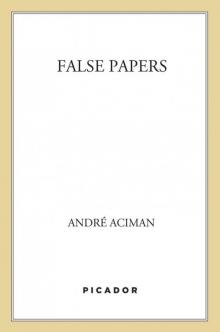 False Papers
False Papers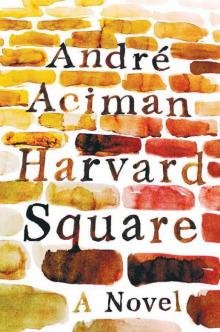 Harvard Square
Harvard Square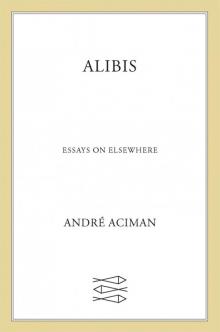 Alibis
Alibis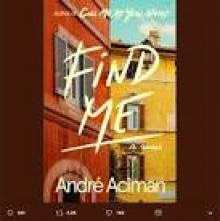 Find Me
Find Me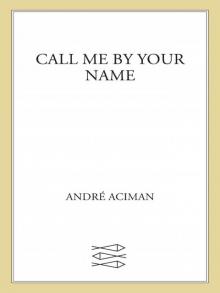 Call Me by Your Name
Call Me by Your Name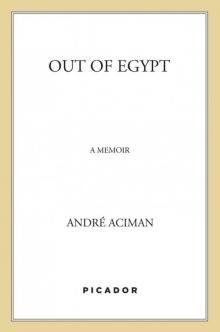 Out of Egypt: A Memoir
Out of Egypt: A Memoir Enigma Variations
Enigma Variations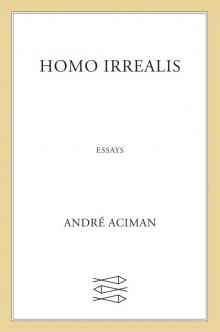 Homo Irrealis
Homo Irrealis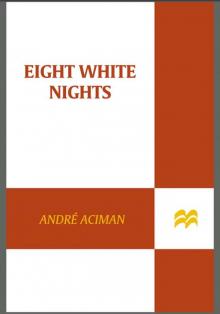 Eight White Nights
Eight White Nights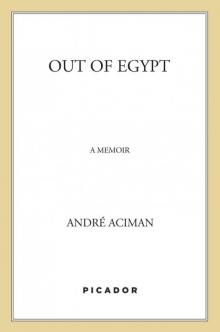 Out of Egypt
Out of Egypt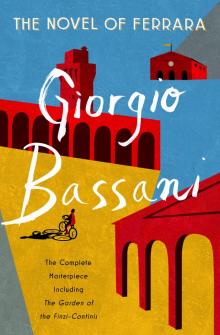 The Novel of Ferrara
The Novel of Ferrara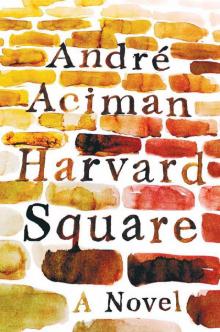 Harvard Square: A Novel
Harvard Square: A Novel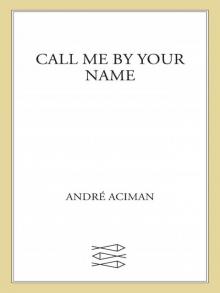 Call Me by Your Name: A Novel
Call Me by Your Name: A Novel